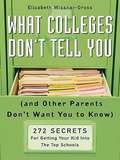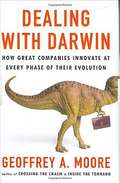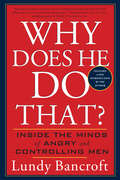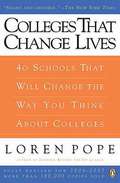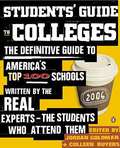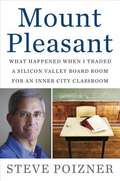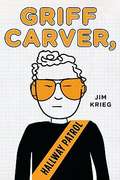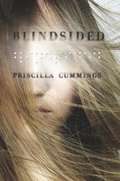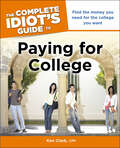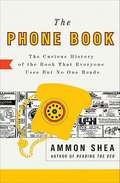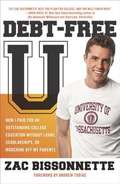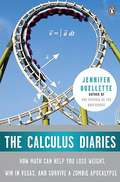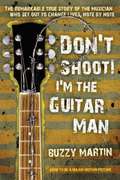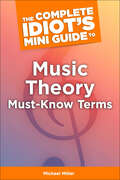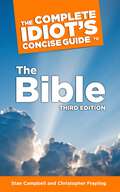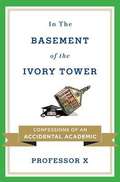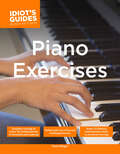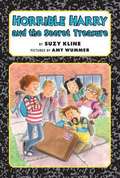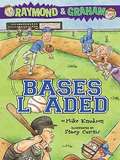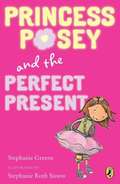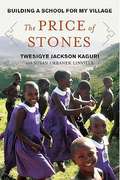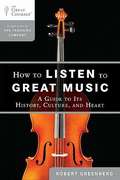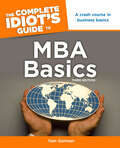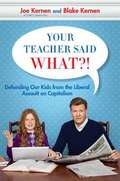- Table View
- List View
What Colleges Don't Tell You
by Elizabeth Wissner-GrossFrom the author of What Colleges Don't Tell You, 250 secrets for raising the kid colleges will compete to acceptThe headlines prove it: Competition for admission to America's top colleges is more cutthroat than ever. Gone are the days when parents could afford to let high school guidance counselors handle the admissions process alone-gone, also, are the days when a student could wait until senior year to prepare for it. As Elizabeth Wissner-Gross, a highly successful educational strategist, knows from working for over a decade with hundreds of middle- and high school students and their parents, if you want to raise a kid colleges will compete for, you must act, early and aggressively, as opportunity scout, coach, tutor, manager, and publicist-or be willing to watch that acceptance letter go to someone whose parents did. What High Schools Don't Tell You reveals 250 strategies to help parents stack the admissions deck in their kid's favor, gleaned from Wissner-Gross's expertise and from interviews with parents of outstandingly high achievers-strategies that most high school guidance counselors, principals, and teachers simply don't know to share. From identifying exactly which academic credentials will wow an admissions committee to which summer programs and extra-curriculars can turn an ordinary applicant into a must-have, What High Schools Don't Tell You demonstrates how hands-on parental involvement early in a child's high school career is essential to achieving college admissions success.
Dealing with Darwin
by Geoffrey MooreThe Darwinian struggle of business keeps getting more brutal as competitive advantage gaps get narrower and narrower. Anything you invent today will soon be copied by someone else--probably better and cheaper. Many companies thrive during the early stages of their life cycle, only to fall slack during periods of inertia and die out while others surge ahead. But as Geoffrey Moore shows, some notable companies have figured out how to deal with Darwin in their mature years--making changes on the fly while fending off challenges from every quarter.
Why Does He Do That?: Inside the Minds of Angry and Controlling Men (Stylecity Ser.)
by Lundy BancroftIn this groundbreaking bestseller, Lundy Bancroft—a counselor who specializes in working with abusive men—uses his knowledge about how abusers think to help women recognize when they are being controlled or devalued, and to find ways to get free of an abusive relationship.He says he loves you. So...why does he do that? You&’ve asked yourself this question again and again. Now you have the chance to see inside the minds of angry and controlling men—and change your life. In Why Does He Do That? you will learn about: • The early warning signs of abuse• The nature of abusive thinking• Myths about abusers• Ten abusive personality types• The role of drugs and alcohol• What you can fix, and what you can&’t• And how to get out of an abusive relationship safely&“This is without a doubt the most informative and useful book yet written on the subject of abusive men. Women who are armed with the insights found in these pages will be on the road to recovering control of their lives.&”—Jay G. Silverman, Ph.D., Director, Violence Prevention Programs, Harvard School of Public Health
Colleges That Change Lives
by Loren PopeThe landmark college guide that introduces forty of the best colleges you've never heard of—now completely revised and updated Choosing the right college has never been more important—or more difficult. For the latest edition of this classic college guide, Hilary Masell Oswald conducted her own tours of top schools and in-depth interviews, building on Loren Pope's original to create a totally updated, more expansive work. Organized by geographic region, every profile includes a wealth of vital information, including admissions standards, distinguishing facts about the curriculum, extracurricular activities, and what faculty say about their jobs. Masell Oswald also offers a new chapter on how students with learning disabilities can find schools that fit their needs. For every prospective college student searching for more than football and frat parties, Colleges That Change Lives will prove indispensable. Fully revised and updated by education journalist Hilary Oswald, Colleges That Change Lives remains the definite guide for high school students (and their parents) who are looking for more in their college education than football, frat parties, and giant lectures. Building on the foundation of landmark author Loren Pope, Oswald spent more than a year visiting 40 colleges, speaking with students, faculty, and alumni to create these vivid and concise portraits. Featuring a new introduction, a new Required Reading section, and a new chapter on learning disabilities, the book is organized into five geographic regions (Northeast, South, Midwest, Southwest, Northwest) to make for easy browsing, and urban, suburban, and rural campuses are all featured. There’s also an alphabetical index of colleges. Each profile includes admissions standards as well as relevant statistics to make your decision easier, including where the school ranks in post-graduate grants and fellowships, what percentage of students go on to graduate school or further education, distinguishing facts about the curriculum, percentage of professors who have terminal degrees in their field, even what activities are available to students and what they’re likely to do on weekends. From the look and feel of the campus, quality of dining hall food and extracurriculars to the percentage of students who study abroad, average SAT scores, and educational philosophy, Oswald anticipates the questions you’ll have and provides the answers (and if you want to know more, there’s a section with contact information for every profiled school). You might not heard of many of these schools, but after reading Colleges That Change Lives you’ll be dying to visit yourself. With more than 150,000 copies sold and 24 printings, Colleges That Change Lives remains the definite college guide book for discerning students. Whether you’ve got straight A's and have always known you’ll go on to higher education or you’ve got a mediocre transcript but suddenly find yourself interested in college, this is the book for you. .
Students' Guide To Colleges
by Jordan Goldman Cilleen BuyersCollege guides are a must for any teenager trying to choose the right school. Unfortunately, most guidebooks are vague, boring tomes written by administrators and journalists, instead of the real experts–the college students that actually go there. Students’ Guide to Colleges is different. Entirely student-written and edited, this invaluable resource cuts through the cant with comprehensive listings of the vital statistics and requirements for America’s top 100 schools accompanied by three totally honest, fresh, fun-to-read descriptions penned by attending undergrads from different walks of life. Want to know how big classes really are? How rigorous the academics get? Or how greek or granola, chill or up-tight, homogenous or diverse, gay or straight, a campus really is? Lively, irreverent, and insightful, the Students’ Guide to Colleges is the only guidebook that offers multiple perspectives on each school and tells it like it is so that college applicants can make the best choice when deciding where they want to spend their college years. More than 30,000 students surveryed Preface by Chuck Hughes, former seniior dean of admissions at Harvard University .
Mount Pleasant
by Steve PoiznerA Silicon Valley entrepreneur takes on the challenge of a lifetime: teaching in one of California's toughest high schools. Entrepreneur Steve Poizner has run a billion dollar company, but the greatest challenge of his life was the year he spent teaching twelfth graders at San Jose's Mt. Pleasant High School. On many days, like the one when a student's boyfriend was arrested for bank robbery, his managerial and entrepreneurial skills seemed irrelevant. But on others, they helped him demonstrate how exciting it is to learn. Playing Jeopardy with the class and inviting speakers into the classroom, Poizner motivated his students by expanding their horizons far beyond their high school's walls. Poizner writes, "Often I came to ask myself one question: What exactly are you doing here? As it turns out, I was receiving one hell of an education." Mt Pleasant is ultimately a success story, as Poizner wins Rookie Teacher of the Year honors and, more important, ensures that all his students graduate.
Griff Carver, Hallway Patrol
by Jim KriegTwelve-year-old Griff Carver knows a thing or two about fighting crime. Because Griff?s not just any kid?he?s a kid with a badge. And if you are a criminal, he?s your worst nightmare. Griff might be the new kid on the Rampart Jr. High Patrol squad, but he?s no rookie. And he?ll do whatever it takes to clean up the mean hallways of his middle school?even if it lands him in hot water. But when Griff links cool kid Marcus ?The Smile? Volger to a counterfeit hall pass ring, can he and his friends close the case? Or will Griff let down the force?and lose his badge?for good? .
Blindsided
by Priscilla Cummings<P>In many ways, Natalie O'Reilly is a typical fourteen year- old girl. But a routine visit to the eye doctor produces devastating news: Natalie will lose her sight within a few short months. Suddenly her world is turned upside down. <P>Natalie is sent to a school for the blind to learn skills such as Braille and how to use a cane. Outwardly, she does as she's told; inwardly, she hopes for a miracle that will free her from a dreaded life of blindness. <P>But the miracle does not come, and Natalie ultimately must confront every blind person's dilemma. Will she go home to live scared? Or will she embrace the skills she needs to make it in a world without sight? .
The Complete Idiot's Guide to Paying for College: Find the Money You Need for the College You Want
by Ken ClarkA higher education without falling deep in debt. With the lack of financial aid, grants, and scholarships available today due to the economic climate, parents and students need serious help in finding ways to pay for college. Savings plans and resources have disappeared. Loans seem impossible to pay off. That's where The Complete Idiot's Guide® to Paying for College steps in. It helps develop an action plan for people to budget and pay for college right now, and if necessary, strategize repayment after graduation. It also explains how to: • Find ways to lower the cost of tuition and room and board • Find honest–to–goodness free money • Discover more affordable options like college credit for military service, peer–to–peer lending, or attending nontraditional colleges and universities
The Phone Book
by Ammon SheaRead Ammon Shea's blogs and other content on the Penguin Community. A surprising, lively, and rich history of that ubiquitous doorstop that most of us take for granted. Ammon Shea is not your typical thirtysomething book enthusiast. After reading the Oxford English Dictionary from cover to cover (and living to write about it in Reading the OED), what classic, familiar, but little-read book would he turn to next? Yes, the phone book. With his signature combination of humor, curiosity, and passion for combing the dustbins of history, Shea offers readers a guided tour into the surprising, strange, and often hilarious history of the humble phone book. From the first printed version in 1878 (it had fifty listings and no numbers) to the phone book's role in presidential elections, Supreme Court rulings, Senate filibusters, abstract art, subversive poetry, circus sideshows, criminal investigations, mental-health diagnoses, and much more, this surprising volume reveals a rich and colorful story that has never been told-until now. .
Debt-Free U
by Zac BissonnetteThis book can save you more than $100,000. These days, most people assume you need to pay a boatload of money for a quality college education. As a result, students and their parents are willing to go into years of debt and potentially sabotage their entire financial futures just to get a fancy name on their diploma. But Zac Bissonnette is walking proof that this assumption is not only false, but dangerous-a class con game designed to rip you off and doom your student to a post-graduation life of near poverty . From his unique double perspective-he's a personal finance expert (at Daily Finance) AND a current senior at the University of Massachusetts-Zac figured out how to get an outstanding education at a public college, without bankrupting his parents or taking on massive loans. Armed with his personal knowledge, the latest data, and smart analysis, Zac takes on the sacred cows of the higher education establishment. He reveals why a lot of the conventional wisdom about choosing and financing college is not only wrong but hazardous to you and your child's financial future. You'll discover, for instance, that:* Student loans are NOT a necessary evil. Ordinary middle class families can- and must-find ways to avoid them, even without scholarships. * College "rankings" are useless-designed to sell magazines and generate hype. If you trust one of the major guides when picking a college, you face a potential financial disaster. * The elite graduate programs accept lots of people with non-elite bachelors degrees. So do America's most selective employers. The name on a diploma ultimately won't help your child have a more successful career or earn more money. Zac can prove every one of those bold assertions - and more. No matter what your current financial situation, he has a simple message for parents: "RELAX! Your kid will be able to get a champagne education on a beer budget!" .
Debt-Free U: How I Paid for an Outstanding College Education Without Loans, Scholarships, or Mooching off My Parents
by Andrew Tobias Zac Bissonnette<p>These days, most people assume you need to pay a boatload of money for a quality college education. As a result, students and their parents are willing to go into years of debt and potentially sabotage their entire financial futures just to get a fancy name on their diploma. <p>But Zac Bissonnette is walking proof that this assumption is not only false, but dangerous-a class con game designed to rip you off and doom your student to a post-graduation life of near poverty . From his unique double perspective-he's a personal finance expert (at Daily Finance) AND a current senior at the University of Massachusetts-Zac figured out how to get an outstanding education at a public college, without bankrupting his parents or taking on massive loans. <p>Armed with his personal knowledge, the latest data, and smart analysis, Zac takes on the sacred cows of the higher education establishment. He reveals why a lot of the conventional wisdom about choosing and financing college is not only wrong but hazardous to you and your child's financial future. You'll discover, for instance, that: <p> <li>Student loans are NOT a necessary evil. Ordinary middle class families can- and must-find ways to avoid them, even without scholarships. <li>College "rankings" are useless-designed to sell magazines and generate hype. If you trust one of the major guides when picking a college, you face a potential financial disaster. <li>The elite graduate programs accept lots of people with non-elite bachelors degrees. So do America's most selective employers. The name on a diploma ultimately won't help your child have a more successful career or earn more money. </li> <p> <p>Zac can prove every one of those bold assertions - and more. No matter what your current financial situation, he has a simple message for parents: "RELAX! Your kid will be able to get a champagne education on a beer budget!"</p>
The Calculus Diaries: How Math Can Help You Lose Weight, Win in Vegas, and Survive a Zombie Apocalypse
by Jennifer OuelletteThe Calculus Diaries is the fun and fascinating account of her year spent confronting her number-phobia head on. With real wit and verve, Ouellette shows how she learned to apply calculus to everything from petrol mileages to dieting, from rollercoaster rides to shooting cards in Las Vegas - proving that anyone can learn the fundamentals of maths' universal language, and make the world a whole lot more comprehensible.
Don't Shoot! I'm the Guitar Man
by Buzzy MartinThis is the story of lifelong musician Buzzy Martin, music teacher to the hardened criminals inside the walls of San Quentin Prison-and what he learned, note by incredible note.
The Complete Idiot's Mini Guide to Music Theory Must-Know Terms
by Michael MillerYou have a passion for making beautiful music, but when it comes to understanding and speaking the musical language, you need a little help. The Complete Idiot's Mini Guide to Music Theory Must-Know Terms compiles dozens of the most important and commonly used terms in the musical lexicon - from notations and chords to modes and scales - explaining them all in clear, concise language.
The Complete Idiot's Concise Guide to the Bible, 3e
by Stan CampbellWith this helpful guide, learn more about the Scriptures that serve as the foundation of Christianity, from the birth to the death and resurrection of Jesus Christ, and everything in between.
In the Basement of the Ivory Tower
by Professor XThe controversial book that crystallized the current debate over the value and purpose of a college education When Professor X's article that inspired this book was published in the Atlantic Monthly, a firestorm of controversy began as teachers across the country weighed in, some thanking him for his honesty and others pillorying him for his warts-and-all portrayal of the downside of universal college enrollment. The article was chosen by David Brooks for a Sidney Award, given to the best magazine articles every year, and kicked off an anticollege backlash. Professor X is an adjunct professor of English literature and composition, a member of the poorly paid underclass who are now teaching the vast majority of our college courses. This is the story of what he learned on the front lines of America's academic crisis. .
The Complete Idiot's Guide to Piano Exercises
by Karen BergerMake sure you hit all the right notes Playing the piano is much more than just learning notes and reading music; having good dexterity, building independent finger strength, and learning proper technique is absolutely essential to mastering the instrument. Packed with everything a player needs to become a great pianist, The Complete Idiot's Guide® to Piano Exercises is the perfect companion to the best-selling The Complete Idiot's Guide® to Playing Piano, Third Edition. • More than 100 challenging exercises designed to improve playing skills, including pedaling, hand crossovers, virtuoso arpeggios, playing dynamics, and more • The author owns and operates a very successful home studio, and is a virtuoso pianist
Horrible Harry and the Secret Treasure (Horrible Harry #30)
by Suzy KlineAnother fun mystery starring Horrible Harry, and this time he's calling the shots! Harry has always loved solving mysteries, and now his friends in Room 3B have learned to love it, too. So Harry challenges them to figure out what he has hidden in his giant, old suitcase. Led by a very determined Mary, the kids take turns solving clues and piecing the mystery together. Their hunt leads them from the classroom to the library, and even to Harry's grandfather's nursing home. Will they be able to solve Harry's mystery? Or will things go horribly wrong for the novice detectives?
Raymond and Graham: Bases Loaded
by Steve Knudson Mike WilkinsonBest friends Raymond and Graham can't wait to defeat their rival team and win the Little League championship, impressing the girls they like and shaming their school bully in the process. But things don't go exactly as planned . . . With kid-friendly humor and funny black-and-white illustrations, this series is perfect for middle-grade readers, especially boys.
Princess Posey and the Perfect Present
by Stephanie GreeneFirst grade is fantastic. Posey loves her new best friends, they do fun things in class, and she adores her teacher. Then it's Miss Lee's birthday and Posey thinks her home-grown roses will be the best present of all. But when her friend brings a huge bouquet from a florist, Posey's roses don't seem special enough and she doesn't give them to her teacher after all. She feels horrible all day, but with some help from her mom, she comes up with the perfect, Posey way to make it up to Miss Lee--an after-birthday present. Make reading sparkle with all of the Princess Posey chapter books! .
A School for My Village
by Kaguri Twesigye JacksonThe extraordinary story of Twesigye Jackson Kaguri, a man from rural Uganda who, after settling in America, returned to his hometown to build a tuition-free school for orphans.
How to Listen to Great Music
by Robert GreenbergThis course can permanently enrich your life in a way that few other experiences can rival: with Professor Robert Greenberg as your teacher, you will suddenly be able to hear and understand an entire language of unmatched beauty, genius, and power. We make strong claims for this course. When you are finished, so will you. Professor Greenberg will provide you with an outstanding grasp of musical forms, techniques, and terms-the "grammatical" elements that make you fluent in the "language" of music. And he will teach about the powerful influence of social context on musical creation. Best-selling author James Collins, writing in Inc. magazine, explains: "The Greenberg series combines a history of western civilization with a history of great music from ancient Greece to the 20th century. Greenberg's 48 lectures come alive with passion and knowledge. The course illustrates the interplay between societal change and innovation, and offers a unique perspective on the acceleration of change wrought by the 20th century. " Using digitally recorded musical passages to illustrate his points, the dynamic Professor Greenberg will take you inside magnificent compositions by Bach, Handel, Haydn, Mozart, Beethoven, Chopin, Verdi, Wagner, Brahms, Tchaikovsky, Stravinsky, and more.
The Complete Idiot's Guide to MBA Basics, 3rd Edition: A Crash Course in Business Basics
by Tom GormanThis is the time to expand your career opportunities-and the knowledge in here can be the key. This third edition compresses the most significant skills and lessons of a two year MBA into one comprehensive guide. With clear, concise information, expert Tom Gorman includes recent developments in management, economics, marketing, leadership, information technology, and communications. Whether the reader is studying to achieve an advanced degree or needs the concrete, practical skills required in the business world, this guide is the most current and comprehensive available. Practical guide to the most significant issues facing business professionals today. A suitable study tool for all graduate students as well as those trying to expand their skills and knowledge in their careers.
Your Teacher Said What?!
by Joe Kernen Blake KernenCNBC anchor Joe Kernen rebels against the liberal brainwashing of his young daughter by the mainstream media and educational establishment.
